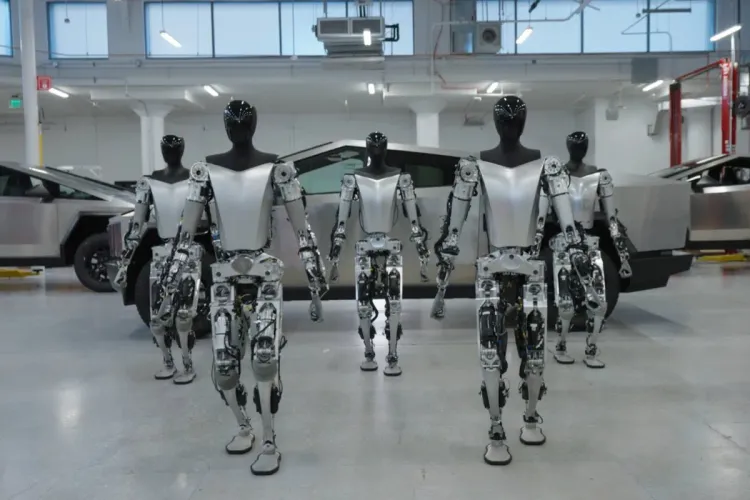Best and Worst Jobs to Have in the AI Economy

Key Points:
- Blue-collar jobs, such as skilled trades and manual labor, are expected to be safe from AI disruption and may even see a substantial boom in the coming years.
- As older Americans retire and leave open jobs, and as demand for healthcare, green energy, high-tech manufacturing, and construction increases, blue-collar jobs are predicted to experience growth.
- While white-collar professionals face a turbulent job market and declining wages, lower- and middle-income workers in blue-collar industries have seen wage growth and improvements in job prospects.
- Jobs that involve personal interaction and non-routine physical tasks are less likely to be disrupted by AI, while routine roles susceptible to automation will see declining wages.



News Interpretation:
- User perspective:
- The AI technology mentioned in the news article can benefit users by making their jobs easier and more efficient. For example, nurses can save time by using AI to automate tasks like collecting and entering patient information, allowing them to focus more on patient care. This technology can also improve safety in the workplace by providing real-time monitoring and alerts for potential risks or equipment issues. However, there may be concerns about job displacement and the need for workers to adapt to new technologies. - Business perspective:
- From a business perspective, the adoption of AI technology can generate revenue and improve efficiency for companies. For example, in the healthcare industry, AI can help reduce healthcare costs by allowing nurses to redeploy their time on more critical tasks, ultimately saving billions of dollars. In industries like construction, AI can be used for tasks like inspections and measurements, freeing up workers to do more complex and skilled work. However, there may be market competition in the AI space, as companies strive to develop innovative and effective AI solutions. - Ethical perspective:
- The ethical implications of using AI technology should be considered. While AI can bring benefits, there may be concerns about job displacement and the impact on workers, especially those in lower-income brackets. It is important for companies to ensure that the adoption of AI aligns with their values and social responsibility, taking into account the well-being and livelihoods of their employees. Additionally, companies should also address any potential biases or discrimination that may arise from the use of AI algorithms, ensuring fairness and equity in their implementation.
How Apple's AI spending and deployment differ from Big Tech rivals

Key Points:
- 🍎 Apple has acquired dozens of AI startups in recent years and embedded AI technologies into its products and services.
- 📱 Apple's biggest advantage in AI is its installed base of over two billion users in the iOS ecosystem.
- 💰 Apple is expected to spend as much as $5 billion a year on AI and is on the cusp of introducing an AI App Store.
- 🌟 While Apple's rivals focus on generative AI models, Apple has targeted machine learning infrastructure.
News Interpretation:
- Perspective 1: User perspective:
Apple's AI technology, embedded in its products and services, offers several benefits to users. For instance, the latest iPhone and Watch models showcase Apple's AI prowess with features like personal voice synthesis, real-time transcription of messages, and advanced health monitoring. Additionally, Apple's upcoming Vision Pro mixed-reality headset will integrate AI into FaceTime, allowing users to create avatars and engage in collaborative activities. These AI capabilities enhance user experiences and provide innovative functionalities. - Perspective 2: Business perspective:
Apple's approach to AI focuses on machine learning infrastructure rather than stand-alone generative AI models. By acquiring AI startups and investing in R&D, Apple aims to integrate machine learning techniques into its consumer products. This strategy aligns with Apple's consumer-centric business model, leveraging its massive installed base of over two billion users in the iOS ecosystem. With the potential introduction of an AI App Store, Apple can further monetize its services business and generate significant revenue. - Perspective 3: Ethical perspective:
While Apple's AI technology offers numerous benefits, there are ethical implications to consider. Apple's emphasis on data privacy and design excellence ensures the safety and privacy of user information. However, this commitment to quality standards may result in slower deployment of AI platforms and technologies. Apple's ecosystem and economic model prioritize user privacy and security, aligning with the company's values and social responsibility. As Apple continues to invest in AI, it should strike a balance between innovation and maintaining ethical standards.
Overall, Apple's AI technology provides valuable features to users, presents revenue opportunities for the company, and upholds ethical considerations. By leveraging its installed base and focusing on consumer applications of AI, Apple remains competitive in the AI space while staying true to its core values.
AI generated images are biased, showing the world through stereotypes - Washington Post

Key Points:
- 🖼️ Artificial intelligence image tools often reinforce harmful stereotypes due to biased training data, including hypersexualization of Asian women and primitive depictions of Africans.
- 🌍 Stable Diffusion, a popular image generator, has made efforts to reduce bias but still defaults to outdated Western stereotypes, such as portraying classical curved roof homes for China and idealized American houses.
- 📷 The latest image generators, including Stable Diffusion and DALL-E 3, disproportionately represent individuals who appear White, female, and youthful, reflecting a Western point of view.
- 🤖 Efforts to eliminate bias in AI image tools include filtering datasets, improving data quality, and encoding rules, but challenges remain in addressing cultural bias and complex visual characteristics.
- 🔒 Transparency and open source models are seen as key to scrutinizing and eliminating bias, but the AI field remains divided on the best approaches to address bias in image generation.
News Interpretation:
- User perspective:
The AI technology of Stable Diffusion XL, an image generator, aims to benefit users by providing them with a tool to generate images based on text inputs. This can be useful in various applications such as graphic design, content creation, and visual storytelling. Users can easily generate images without the need for artistic skills or expensive software. However, there are potential risks and concerns for users as the technology has been found to amplify biases and stereotypes present in the training data. This can result in the generation of images that perpetuate harmful stereotypes and reinforce existing biases. - Business perspective:
From a business perspective, the AI technology of Stable Diffusion XL can generate revenue by offering a paid subscription model or licensing the technology to other companies. It can also improve efficiency for businesses by automating the image generation process, saving time and resources. However, there are potential market opportunities and competition in the AI image generation space, with other companies also developing similar technologies. To stay ahead in the market, Stable Diffusion XL needs to continuously invest in reducing bias and improving the quality of the generated images. - Ethical perspective:
The use of AI technology in image generation raises ethical implications, particularly regarding bias and fairness. The technology has been found to perpetuate stereotypes based on race, gender, and other factors, which can have negative social implications. This raises concerns about the responsible use of AI and the need for companies like Stable Diffusion to prioritize reducing bias and promoting diversity and inclusion in their training data. It is important for companies to align their AI technologies with their values and social responsibility to ensure that they are not contributing to harmful biases or discrimination.
Scientists excited by AI tool that grades severity of rare cancer

Key Points:
- 🤖 Artificial intelligence (AI) is nearly twice as accurate as the current method in grading the aggressiveness of a rare form of cancer from scans, according to a study.
- 🩺 By recognizing details invisible to the naked eye, AI achieved an 82% accuracy rate, compared to 44% for lab analysis.
- 🏥 The use of AI in cancer diagnosis could lead to faster diagnosis, more personalized treatment, and better outcomes for patients.
- 💻 AI has already shown promise in diagnosing breast cancers and reducing treatment times, and researchers are excited about its potential for early detection of other cancers.
News Interpretation:
- User perspective:
- The AI technology discussed in the article offers significant benefits to users. By analyzing scans of rare forms of cancer, AI is nearly twice as accurate as the current method in grading the aggressiveness of the cancer. This improved accuracy can lead to better treatment outcomes and personalized treatment plans for patients. Additionally, AI has the potential to detect other cancers early, further enhancing its value in the medical field. Overall, this technology can improve diagnosis speed, accuracy, and personalized treatment for cancer patients, providing them with better outcomes and a quicker path to recovery. - Business perspective:
- From a business perspective, the AI technology showcased in the article presents several opportunities for revenue generation and efficiency improvement. Companies specializing in AI can develop and market AI-powered software or systems that can be used by healthcare providers to analyze medical scans and assist in cancer diagnosis. This can lead to increased sales and partnerships with hospitals and medical institutions. Furthermore, the implementation of AI technology can improve the efficiency of diagnosis and treatment processes, reducing costs and improving patient outcomes. By capitalizing on the growing demand for AI in healthcare, companies can establish themselves as leaders in the field and gain a competitive advantage. - Ethical perspective:
- The use of AI technology in healthcare raises important ethical considerations. While AI can greatly improve diagnosis accuracy and treatment outcomes, there is a concern about the potential for overreliance on AI and the possibility of human judgment being undermined. It is crucial to ensure that AI is used as a tool to assist healthcare professionals rather than replace them. Additionally, privacy and data security are significant concerns when using AI in healthcare, as sensitive patient information is involved. Companies must prioritize the protection of patient data and comply with relevant regulations to maintain trust and ethical standards. It is essential to strike a balance between the benefits of AI and the ethical implications to ensure responsible and ethical use of this technology.
Countries at a UK summit pledge to tackle AI's potentially 'catastrophic' risks

Key Points:
- Delegates from 28 nations, including the US and China, have agreed to work together to contain the potentially "catastrophic" risks posed by advances in artificial intelligence.
- The first international AI Safety Summit, held at a former codebreaking spy base near London, focused on cutting-edge "frontier" AI that could pose a risk to humanity's existence.
- British Prime Minister Rishi Sunak called the agreement a "landmark achievement" and emphasized the urgency of understanding AI risks for the future.
- US Vice President Kamala Harris urged countries to go further in addressing AI risks, including holding tech companies accountable through legislation.
- The summit included attendees such as Tesla CEO Elon Musk, European Commission President Ursula von der Leyen, and executives from AI companies like OpenAI and Google's DeepMind.
News Interpretation:
- User perspective:
- The advancement of Artificial Intelligence (AI) technology brings several benefits to users, including improved efficiency, personalized experiences, and enhanced decision-making capabilities. AI can automate repetitive tasks, saving users time and effort. It can also analyze large amounts of data to provide personalized recommendations and insights. However, users should be aware of potential risks and concerns associated with AI, such as privacy breaches, biased algorithms, and job displacement. - Business perspective:
- AI technology presents significant opportunities for businesses, including revenue generation and increased operational efficiency. Companies can leverage AI to streamline processes, optimize resource allocation, and enhance customer experiences. AI-powered solutions can also enable businesses to gain insights from data and make data-driven decisions. However, businesses should be mindful of market competition and ensure that their AI solutions align with their overall business strategy and goals. - Ethical perspective:
- The use of AI technology raises ethical implications that need to be considered. Ethical concerns include the potential for biased algorithms that perpetuate discrimination or reinforce existing societal inequalities. It is crucial for companies to develop AI systems that are fair, transparent, and accountable. Additionally, companies should prioritize user privacy and data protection, ensuring that AI technologies are used responsibly and in compliance with relevant regulations. Ethical considerations should be integrated into the design, development, and deployment of AI systems to ensure that they align with the company's values and social responsibility.






Member discussion